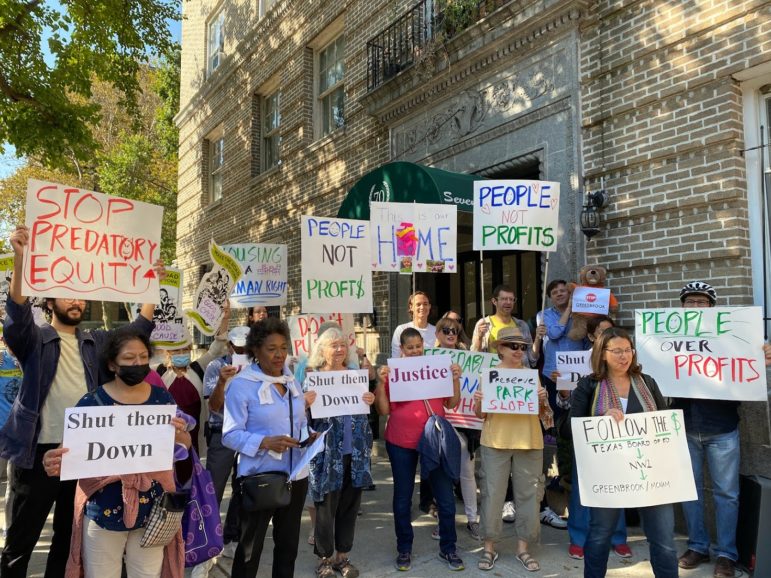“Corporations exist to make profit. In the housing context, corporate landlords extract as much profit from their investments as possible. The results are rent increases, cost-cutting on building maintenance, reductions in building-wide services, low-cost or inadequate repairs, and evictions.”

David Brand
Tenants and elected officials rallied outside 70 Prospect Park West last fall, where residents say a new corporate owner began evicting tenants last year.This month, New York City’s Rent Guidelines Board is expected to greenlight the biggest rent increase in a decade, the latest piece of bad news for tenants facing a record housing crisis. Rents are skyrocketing by double-digits in New York and evictions are soaring to levels not seen since before the pandemic.
The Board has claimed that it’s only looking after small landlords, the “mom-and-pops” who saved up to buy an investment property and now struggle to make ends meet. It’s hard to argue that we shouldn’t support such real estate entrepreneurs, especially Black and brown homeowners, for whom becoming a landlord is a route to building generational wealth.
But do such mom-and-pops represent the typical landlord in New York City? New data that my organization released this week shows that they don’t.
In fact, the data shows that corporate landlords have steadily come to dominate New York’s residential real estate market—and that unless lawmakers take action, such landlords could soon squeeze out the very mom-and-pops that we’re trying to protect.
Our data looks at residential deed transfers, the documents new buyers have to file to show that a home is shifting to new owners. These deed transfers show whether the buyer is an “individual” or “corporation.” To eliminate the chance that corporate buyers could actually just be an individual transferring property to their own LLC, we excluded deed transfers below $100—i.e. a nominal sale price listed simply to transfer ownership. Then, for all New York City property sales over the last two decades, we compared the number of properties purchased by corporations with those purchased by individuals.
The data reveals that, while individuals were the predominant buyers of property between 2000-2010, corporate acquisitions overtook individual purchases shortly after the 2008 economic recession. And since 2011, corporate landlords have remained the primary type of residential real estate transaction. Between 2009 and 2014, corporate acquisition of buildings with three or more units tripled.
The data also reveals that currently, a corporate owner is listed for a whopping 89 percent of units across New York in buildings registered with the Department of Housing Preservation and Development (HPD). Moreover,while in 2003, corporations were the predominant buyers in only 19 percent of city zip codes, by 2014, corporations became the predominant buyers of buildings with three or more units in 70 percent of NYC zip codes.
Why is this bad? Corporations exist to make profit. In the housing context, corporate landlords extract as much profit from their investments as possible. The results are rent increases, cost-cutting on building maintenance, reductions in building-wide services, low-cost or inadequate repairs, and evictions. Our data shows that in neighborhoods where corporate landlords increased their ownership stakes, the rates of evictions also rose.
The landlord lobby argues that limits on rent increases and measures like Good Cause Eviction hurt “mom-and-pop” landlords across the city. They say that these small landlords are already struggling to pay their gas bills, property taxes, and mortgages, and would be crippled by additional tenant-protection measures. Limits on rent increases by the Rent Guidelines Board do not impact owners of market rate housing—the typical small landlord. Good Cause Eviction would not apply to owner-occupied buildings with less than four units.
The numbers don’t lie: Corporations—not stronger rent laws—are here to take down“mom-and-pop.” Stronger tenant protection laws that prevent huge rent increases and eliminate no cause evictions will serve to protect vulnerable households across the state.
Sateesh Nori is the executive director of JustFix









One thought on “Opinion: Corporate Landlords Are Taking Over NYC—The Numbers Don’t Lie”
Who could have predicted that HSTPA of 2019 and a two-year eviction moratorium would bankrupt “mom and pop” landlords and dramatically accelerate the trend of selling to larger corporations?